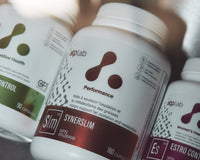
Skip the Fads and Gimmick Products. Lose Fat Smarter.
We’ve all seen flashy new years weight-loss ads that promise quick fixes. The problem is that there’s no such thing as a quick fix without side effects.

The Daily Signal Most People Ignore: Blood Glucose Regulation
This week, we’re shifting to something that fluctuates every single day: your blood glucose ("blood sugar").

The Step Everyone Misses: Digestion Starts Before the Gut
Learn about what you "should" be doing well before your food is digested.

Probiotics Don't Work Alone
After sending out last week’s newsletter on Probio 7 and how quickly your microbiome responds to holiday stress, sugar, alcohol, and routine changes, many people reached out saying: “Okay… I’m taking the probiotic. What’s next?”

Why Does Your Gut Feel Heavier or More Sensitive during the Holiday Season?
Every year, so many people enter December with the best intentions, only to feel weighed down by stress, excess sugar, disrupted sleep, and the pressure of an overloaded schedule. It’s a season filled with warmth and celebration, yet it often leaves your digestion feeling anything but festive.

How to Optimize Testosterone Levels and Function
Alpha Jack is a powerful supplement designed to support your body’s natural ability to increase endogenous testosterone levels.

4 Ways To Naturally Support Detoxification (and Testosterone Levels!)
We've been talking a lot about detoxification this month. But for good reason - it's one of the most important variables for sex hormones, including testosterone, but it doesn't get talked about.

Testosterone Drops For Reasons Other Than Age
Does the aging male face unique hormonal challenges that a young male doesn’t? No question.
But the (negative) effect of age might not be as dramatic as you think.

The 1% Testosterone Drop You Didn’t Notice
Every year after 30, men lose about 1% of their testosterone. That might not sound like much — but think about the accumulative effect. How much have you lost from age 30 to 40? Or age 30 to 50?

Small Nutrients, Big Impact: Supporting Your Immune System Daily
You know that your immune system has numerous 'divisions', you also know that specific divisions require certain micronutrients……what else does this 'military-like' immune system require?

Defend, Repair, Recover: The Zinc Advantage
You've seen how your immune system has multiple divisions….

From Sunshine to Strength: Understanding Vitamin D3 and K2
You wake up with the dreaded scratchy throat, congested head, and exhaustion, you think to yourself: "what gives, I eat healthy and exercise more than most people!" There's no question that diet and exercise are two of the most important (or the most important) two variables for immune function.






